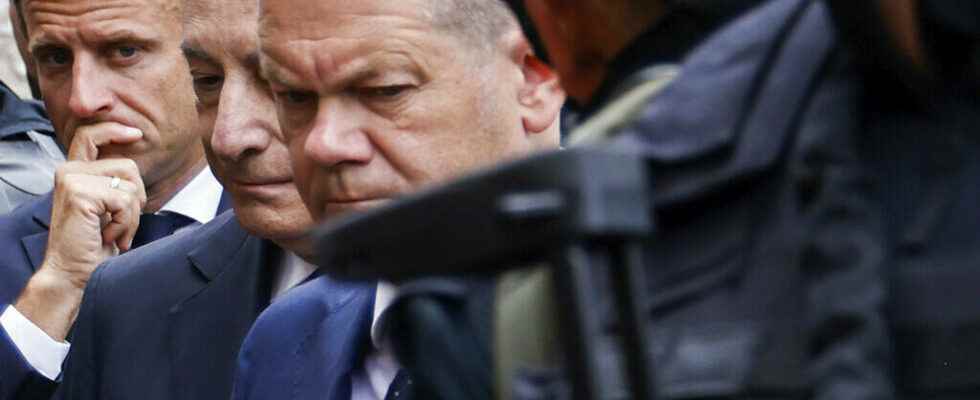A press review presented in partnership with The Balkan Courier.
The French president went to Romania then to Moldova before going to kyiv on Thursday with German Chancellor Olaf Scholz and Italian Prime Minister Mario Draghi. A very political visit to prepare the ground for the European Council of 23 and 24 June, and to sell his idea of a “European political community”, in other words a multi-speed Europe.
On Wednesday, the Albanian and Montenegrin Prime Ministers had met Volodimir Zelensky in kyiv, a first for Western Balkan leaders. At the same time, the Serbian head of state, Aleksandar Vučić, confirmed the arrest of Andriy Naumov, former head of the Ukrainian intelligence services, when he was trying to cross the border into North Macedonia. In his BMW sedan, the police found 600,000 euros and 125,000 dollars in cash. Belgrade has not yet indicated anything about his possible extradition.
Serbia, which still refuses to align itself with Western sanctions against Moscow, has also made available to the Belarusian national football team the stadium in Novi Sad, the big city in the north of the country, to allow him to dispute the Nations League. UEFA requires Belarus to play its international matches on “neutral ground” and behind closed doors because of its support for the Russian invasion of Ukraine. This decision would have “no political connotation” nevertheless assures the Serbian football federation.
Tensions in the Aegean Sea between Greece and Turkey
The Russian invasion of Ukraine also has repercussions in Bosnia and Herzegovina. Many have raised the possibility that the country, still deeply divided since the end of the 1992-95 war, constitutes a second front. Especially at a time when the Serbian entity was taking the path of possible secession. After three months of fighting on the Ukrainian front, it seems rather that this conflict has contributed to curbing the separatist tendencies, not only of the Serbs, but also of the Croats. To analyse.
After a semblance of calm, the rag is burning again between Athens and Ankara. In question, this time, the demilitarization of the islands of the Aegean Sea, very close to the Turkish coast. While the war in Ukraine is raging, NATO is annoyed and calls on the two countries, members of the Alliance, to reason.
The Balkans, the first access route for exiles to the EU
Since the beginning of 2022, the “Balkan route” has once again become, by far, the main access route to the European Union for irregular migrants. According to Frontex, the European Border Guard Agency, the increase in crossings is +167% compared to last year. Despite the violent and massive repressions of the local police.
Two weeks after taking office, Robert Golob sent a strong message: the Slovenian Prime Minister announced the removal of the fence erected at the time of the “migration crisis” of 2015 against refugees at the Croatian border, deeming it “inhumane and unnecessary”.
In lack of manpower, Romania has been issuing visas to workers from Asia since 2017. At the end of the trip, merciless exploitation and the risk of falling into illegality at the end of their contract and then being expelled without the possibility of appeal. Second part of the Courrier d’Europe centrale investigation.
Early marriages in Bosnia and Albanian-Montenegrin regional cooperation
They were sold or promised to a husband by their family when they were not 18 years old. And nothing has changed in the last ten years for the minors of the Bosnian Roma community. However, laws exist and associations are fighting to prevent future generations from suffering the same fate. Reportage.
Albania and Montenegro will jointly build a bridge over the Bojana/Buna river. This work of art, 310 m long, should link the seaside towns of Ulcinj and Velipojë in Albania from 2024. A good example of regional cooperationrejoice in advance the two countries.
With his sweaters and thick mustache, Vasil Tupurkovsky was a major figure in the final act of the dissolution of Yugoslavia. Representing Macedonia in the collegiate presidency, he tried to the end, if not to save the Federation, at least to prevent war. Portrait.
